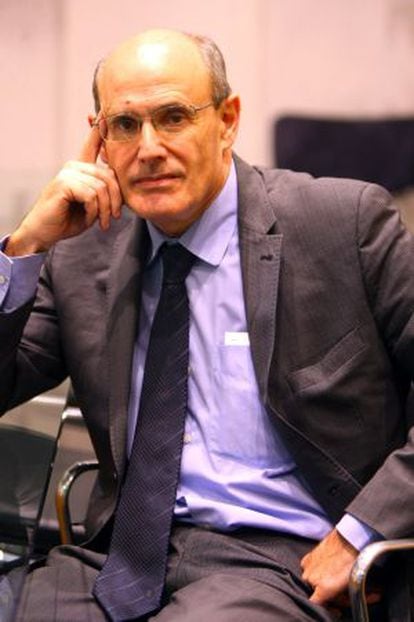“Obesity is the greatest problem”
Rafael Bengoa will be working as an advisor to the US on healthcare reform

He is hanging up his Basque health commissioner cap to become one of the European advisors who will help the US administration implement its healthcare reform. Venezuela-born Rafael Bengoa insists that the key to a sustainable public health system does not lie in spending cuts, but in monitoring patients more efficiently and in modifying the "behavior" of the system with strategies like the ones he has introduced in the Basque Country.
Bengoa says it is evident that the US had to do something about its health system.
"Sixty-three percent of family bankruptcies are caused by health costs, one out of every six Americans has no health coverage, mortality rates are not good, vaccination and longevity rates are worse than in Europe [...] and all that while spending 17 percent of their GDP on health, while we only spend eight percent with better results.
"Now everybody is saying that the Spanish health system is expensive, but I insist: it yields better results than the US system, which after the reform will be taking up 20 percent of GDP."
Question. You say that Spain is better off than the US, but is this model sustainable?
Answer. It is sustainable now, but it is underfunded in many places. The problem is that if we eliminate debt through cuts, but tell the system to remain the same, the debt will just grow again in a few years. In general what you see in Spain is a search for a magic wand, an introduction of specific and isolated measures. Without a complex, integral change, we will achieve nothing. And Brussels is going to demand that we maintain the public health system, but with structural changes. Without this, you can introduce a bit of co-payment here, a bit of private management there, but none of it addresses the core issue: our behavior and the patients' behavior. The health system is like a teenager: even if you come to the rescue at a given moment, if you don't work on changing his behavior, he will do it again, and will need to be rescued again, and more cuts will be made.
Q. But cuts will not prevent the system from becoming unsustainable.
A. Up until now we've had growing demand - and the trend continues - and our answer to that has been more human resources, more technology and more drugs. But that was back when the budget was growing eight percent or more. Now we don't have that, yet demand keeps growing. The answer now is, you either transform the sector or you will have to cut it. Many people would like to make it look like the public health system is inoperative, but we have proven that change can be carried out.
Q. If you were the Madrid health commissioner...
A. I will not give my opinion on his management. But what I see in Spain is disorder. If privatization is going to be launched, there has to be an assessment group. I have yet to see anything to indicate that the private sector is going to do better than the public one. I would not go down that road yet.
Q. Would you take away certain services?
A. We need to take away things that do not add clinical value. They are identified: thousands of X-rays, magnetic resonances. Addressing this issue might be felt as a cutback by citizens, but it isn't.
Q. You have launched a technological product in partnership with the company that developed it. You will share the profits. Should the public health system have this more entrepreneurial focus?
A. Of course. We have taken advantage of a formula launched by former Health Minister Cristina Garmendia and consisting of innovative public purchases. I think we in the Basque Country are the only region to apply it. The public and the private sector need to have parallel lives, not separate ones.
Q. You are known for your battles against Big Pharma and the tobacco industry. Any others left?
A. The pharmaceutical industry is a partner, we need to find a healthier relationship model. The tobacco industry I fight to the death; I have been at the WHO, I've seen Philip Morris lying shamelessly. Many of them should be in jail. The other big one is the food industry because obesity is the greatest public health problem in Europe.










































